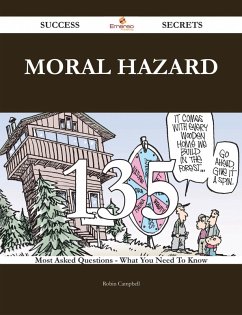The latest Moral Hazard sensation. In financial hypothesis, a 'moral hazard' is a state of affairs wherever a party must have a propensity to take hazards since the outlays that might effect tend to not be sensed by the party seizing the hazard. In different terms, it is a propensity to be further ready to take a hazard, realizing that the prospective outlays either burdens of seizing such hazard tend to be borne, in entire either in piece, by other ones. A meaning hazard might happen wherever the activities of one party might shift to the harm of one other following a monetary undertaking has taken place. There has never been a Moral Hazard Guide like this.
It contains 135 answers, much more than you can imagine; comprehensive answers and extensive details and references, with insights that have never before been offered in print. Get the information you need--fast! This all-embracing guide offers a thorough view of key knowledge and detailed insight. This Guide introduces what you want to know about Moral Hazard.
A quick look inside of some of the subjects covered: Unemployment benefits - Economic rationale and issues, Gramm-Leach-Bliley Act - Criticisms, Opportunism - Economic opportunism, Savings and loan crisis - Failures, Risk - Human factors, Collateralized debt obligation - Criticism, One share, one vote - Mechanisms and controls, Charitable organization - Growth during 19th century, Bank run - Individual banks, Market failure - The Nature of the Exchange, Monetary economics - . Robert Clower, 1969b. What Traditional Monetary Theory Really Wasn't, Canadian Journal of Economics. 2(2), pp. [http://www.jstor.org/pss/133641 299]-302. . David Laidler David E.W. Laidler, 1991. The Golden Age of the Quantity Theory: The Development of Neoclassical Monetary Economics, and much more...
It contains 135 answers, much more than you can imagine; comprehensive answers and extensive details and references, with insights that have never before been offered in print. Get the information you need--fast! This all-embracing guide offers a thorough view of key knowledge and detailed insight. This Guide introduces what you want to know about Moral Hazard.
A quick look inside of some of the subjects covered: Unemployment benefits - Economic rationale and issues, Gramm-Leach-Bliley Act - Criticisms, Opportunism - Economic opportunism, Savings and loan crisis - Failures, Risk - Human factors, Collateralized debt obligation - Criticism, One share, one vote - Mechanisms and controls, Charitable organization - Growth during 19th century, Bank run - Individual banks, Market failure - The Nature of the Exchange, Monetary economics - . Robert Clower, 1969b. What Traditional Monetary Theory Really Wasn't, Canadian Journal of Economics. 2(2), pp. [http://www.jstor.org/pss/133641 299]-302. . David Laidler David E.W. Laidler, 1991. The Golden Age of the Quantity Theory: The Development of Neoclassical Monetary Economics, and much more...
Dieser Download kann aus rechtlichen Gründen nur mit Rechnungsadresse in A, D ausgeliefert werden.


